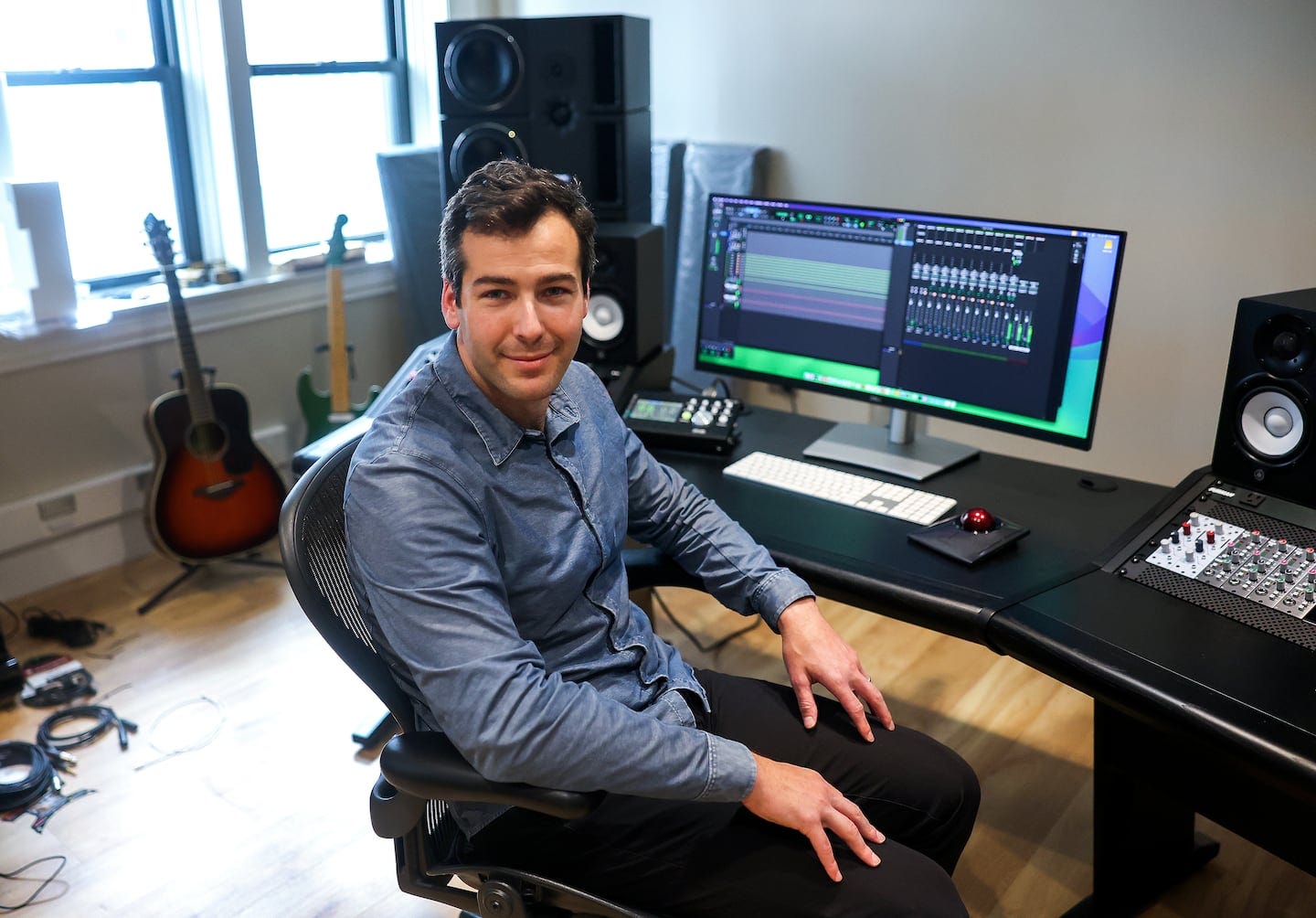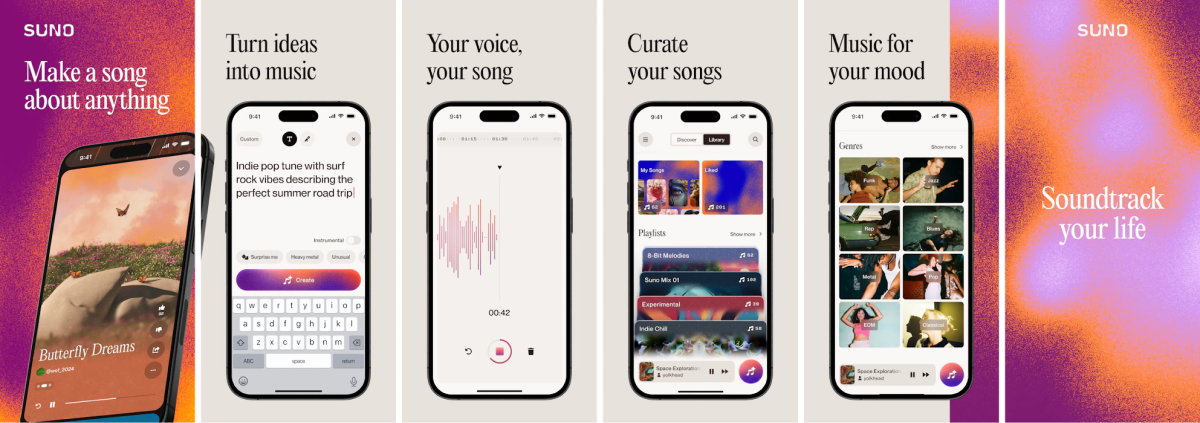Inside Suno, the AI Music App You Won't Be Able to Stop Listening To | Mikey Shulman (Suno)
How music LLMs work, how Suno builds AI products, and the good and bad futures for AI and music
Dear subscribers,
Today, I want to share a new episode with Mikey Schulman.
Mikey is the CEO and co-founder of Suno, my favorite AI music app. 25M users have used Suno to create their first song, and I’ve had so much fun using it to make tunes with my kids. In our chat, Mikey shares how music LLMs work, how Suno builds AI products, and the good and bad futures of AI and music.
Watch now on YouTube, Apple, and Spotify.
Mikey and I spoke about:
(00:00) The good and bad futures of AI in music
(03:41) How Suno's music AI actually works
(07:31) Building for personalization without losing humanity
(10:34) Turning text into actual songs
(14:06) Product iteration in uncharted territory
(20:37) Core principles for building AI products
(25:06) How streaming changed everything
(31:35) What's next for AI music in 2025
Read on for the takeaways.
Mikey’s journey starting Suno
Welcome Mikey! Can you tell us about your background and how you started Suno?
I've played music since I was four years old — piano growing up, then bass in bands during high school and college. After college, I took a different path, getting a degree in physics before joining an AI company.
Starting Suno was a beautiful accident. The founders and I were all at Kensho, an AI company for financial services. We mostly worked on text and natural language processing, but we had one audio project: Automating earnings call transcription.
That project made us realize sound was so much more interesting than text, yet so far behind on the AI front.
Since we were all musicians, we decided to leave to start an audio company. It took a few months to commit fully to music. People warned us that music wasn’t the obvious path compared to speech recognition, but we loved music too much to give up.
With speech, you can verify correctness, but music is more subjective. How do you think about that?
Exactly. Music isn't about getting the right answer — it's taste-based and subjective. Scale alone doesn't solve that, so it requires a very different approach.
So text-based LLMs are trying to predict the next word. But how does a music-based LLM work?
It's surprisingly similar. We also use transformers and our edge is figuring out how to tokenize audio correctly.
Tokenizing text is straightforward because you're basically working with words. Audio is much trickier because it's a continuous signal sampled about 50,000x per second. A one-minute audio clip has far too many tokens, so you have to work hard to find the signal and downsample it without losing quality.
Think of it like an MP3 codec that compresses audio. Our approach is similar — we create a discrete representation for small bits of audio. The model doesn't know about instruments, musical tones, or voices. It just knows sound. By teaching it to predict the next bit of sound, it becomes capable of producing music.
Inside how Suno builds AI products
What's your vision for Suno? If it's successful, what would the world look like?
I believe that music is part of every culture, language, and DNA.
Our vision is to make music more valuable for a billion people.
Currently, most people experience music through passive listening. It's not engaging, interactive, or social. For me, music should be all those things — fun by yourself but also great with friends. It should feel almost like a video game.
If we can bring the joy of music creation to people who don't play instruments or produce music, we'll have created enormous value. We'll have elevated music for everyone on the planet.
I love using Suno to create songs with my kids, such as this song about lactose intolerance. What’s making users stick to the platform — is it creation or listening?
Creation is what brings people in initially, but we see several sticky use cases. People who come to create often stay to listen. The listening experience is also quite varied — there's such a thing as "lean-in listening," like when you put on your best headphones for a new song from your favorite artist.
A lot of it comes down to personalizing music, not just by genre preferences like Spotify, but by making it truly personal.
Think about how people take selfies and share them - that wasn't possible 20 years ago. The same will happen with music.
People connect with music both for how it sounds and because they identify with the creator. Our goal is to open that up to more people.
Can you share any numbers about Suno’s growth?
25M people have created songs on Suno, most for the first time. On the product side:
One metric I watch closely is the chance that a new user will hit the paywall on their first day.
Hitting the paywall means they enjoyed the app enough to create 10 free songs. This rate is nearly 50%, which is quite high and a strong indicator of product enjoyment. People won't keep coming back if they don't enjoy the experience.
How is Suno's user base distributed between casual and power users?
It's fairly bimodal.
We have power users who spend hours making amazing songs, perfecting them until they match their vision.
Then we have casual users who make songs with their kids or about funny moments in their life, like Starbucks misspelling their name. We call this "soundtracking your life."
Interestingly, there isn't much in between these groups. Both categories have many daily active users, but they use the product very differently.
Do you have tips for creating great Suno songs for the casual users like me?
Learning to describe music is crucial. Beyond using genres, you can describe emotions, tempo, and mix different genres in interesting ways. One technique I'm fond of is capturing sounds from daily life and uploading them as inspiration. It makes the music uniquely personal because it comes from your life.
Think of Charlie Puth, who's gone viral for making music from ordinary sounds. He's an incredible musician with perfect pitch, but I find it almost offensive that this should be limited to people with his talent. Making music from everyday sounds should be accessible to everyone.
How do you and the team decide what product to build next? For example, you recently launched the v4 model which has much better music quality than before.
V4 was in some ways an obvious product improvement with higher audio fidelity, catchier songs, better lyrics. It was more of a machine learning-led project since the product interface didn't change much.
But something many AI companies miss is that you're in the business of building a product, not just selling a model.
The best product isn’t just what your AI model can do, but what you intentionally design to do.
My favorite Suno feature is probably music covers. Music resonates with us because it's the right mix of the familiar and foreign. With covers, you get the familiarity for free through the original song, then you can innovate on the sound. It's a comfortable introduction to music creation since users don't need to start from scratch.
This feature required solving both technical and interface challenges. How do we make the same song in a different genre? How do we create an intuitive way for users to adapt songs? Great products come from tight feedback loops and iteration.
How did you realize you should build the covers feature?
It came from various sources. Professionals would sometimes ask to recreate a song with small changes. We realized this had mass market appeal if we framed it as covers. It was a combination of user feedback, professional input, and iteration.
Do you have a community of Suno users you regularly talk to?
Yes, we're fortunate to have a very large and engaged Discord community - about 400,000 people. We started with the product only on Discord, and while the feedback can be noisy, there's valuable information there.
What metrics do you monitor for Suno?
We track standard metrics like retention and user growth, but also specific things like what fraction of songs get liked. This metric is surprisingly sensitive.
For example, if latency increases from 10 to 13 seconds due to a bug, users will like their songs less - even though the song quality is the same. It shows how crucial the user interface is.
How do you decide if something is good enough to ship, given AI’s non-deterministic nature?
This is a challenging problem without clear benchmarks. We got lucky with V4 because we improved everything we cared about.
But future versions might improve some aspects while slightly degrading others. We use various heuristics, like testing new models on 1% of songs to measure like rates, but ultimately it comes down to good judgment. Having people with good musical judgment is far more important than technical skills alone.
What are some hard-won lessons or principles you've learned about building products?
The biggest AI product principle is that while AI is our essential tool for building songs, users shouldn't care - or even know - that it's AI.
We're in the business of selling musical experiences, and AI is just a means to an end. If there were an easier way to do what we do, we'd use that instead.
I see many products that are basically thin wrappers around AI models, where features are determined by what their model can do. That's backward. Your product should be built around what users will love, then you figure out how to make your AI model deliver that. This is challenging when you start as an AI company with 100% ML engineers, but making that shift to truly caring about users is crucial.
We also started charging users from the beginning, which though unconventional, has been incredibly valuable.
It gave us clear signal about what people genuinely value enough to pay for. Without this approach, we might have the same number of daily active users, but they wouldn't be as engaged and Suno would just be a novelty to them.
What's your view on AI companies and competitive advantages?
I don't think AI companies present new types of moats.
To be a generational company, you need a superior product with some sort of data or network moat. AI is just a means to an end.
What have been some tough moments building Suno?
I think I have the best job in the world. But we’re in the highly litigious music industry, which presents various challenges.
We're currently being sued, which I'd certainly rather not be dealing with.
I'm also really glad we're an in-person company. I feel fortunate to have started post-COVID and made that decision once. I get to work shoulder-to-shoulder with coworkers I enjoy being around — we're literally recording this in our actual studio.
How Suno and AI will forever change music
Ok let’s talk about the music industry. Before we talk about AI, how is the industry doing overall?
Well let’s take a quick look at the history of the music industry.
Originally, you could only hear music by hiring musicians or playing yourself. Then came recordings on vinyl, where each recording was unique. People thought this would cheapen music, but it made it more accessible. Then came CDs, followed by streaming.
The ability to easily copy digital music led to widespread piracy, which devastated industry revenues — up to 85-90% in some countries. But the industry found a new business model that's great for consumers. Now I have every piece of music in my pocket through services like Spotify and Apple Music. The industry had its biggest year in a long time in 2024.
What do you think AI’s impact on music will be?






